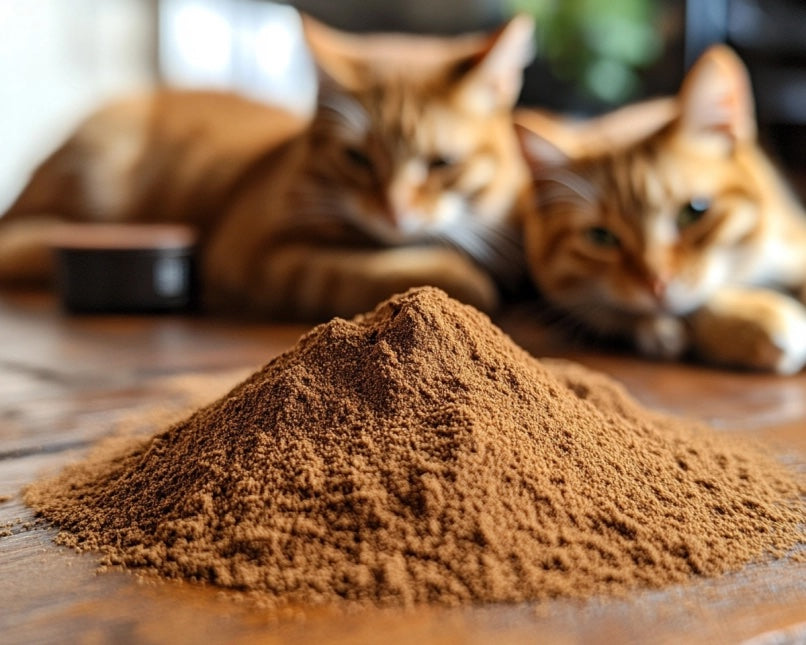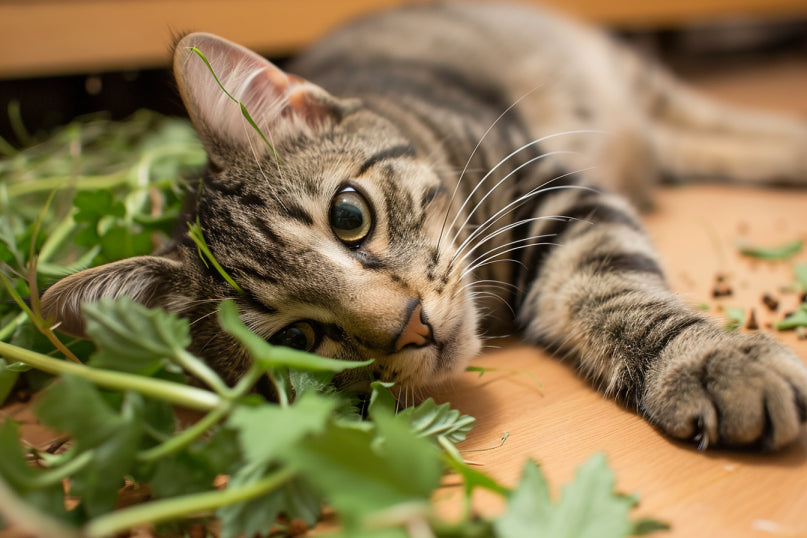
If you’re a cat parent or you’ve been to an animal shelter, you’ve probably seen adoptable cats with FIV labels.
Cats with FIV are often considered un-adoptable and routinely euthanized by shelters. What’s FIV? What does it mean for cats to be FIV-positive?
We talked to Shadi Ireifej, the Chief Medical Officer at VetTriage, to learn more about FIV in cats.
What’s FIV?
FIV is short for Feline Immunodeficiency Virus. It’s a lentivirus that’s similar to HIV in humans. FIV slowly weakens a cat's immune system by damaging white blood cells, also known as leukocytes, that kill and digest bacteria and fungi. Once cats are infected with FIV, it’s permanent. They’re also more vulnerable to various forms of cancer, blood diseases, or kidney failure.
How common is FIV in cats?
Cats with FIV are found worldwide. Males are 400 times more likely to get FIV than females. The median age of infected cats is eight years. The FIV infection rate varies greatly between countries, ranging from 12 percent in Japan to 6 percent in the U.K. In the U.S. approximately 0.7 percent of healthy, indoor cats and 18.2 percent of sick, feral cats are infected with FIV. Cats with pus-filled open sores have a 12.7 percent chance of testing positive for the disease.
How do cats get FIV?
- FIV is called the “mean cat disease” because it’s mostly passed through deep bite or scratch wounds. During aggressive fights and territorial disputes, intact free-roaming males are eight times more likely to catch FIV.
- Intact females are nearly 4 times as likely to be diagnosed with FIV. An infected mother cat can pass on FIV antibodies through her blood to her kittens. She won’t pass the virus because it can’t cross the placenta. FIV tests look for antibodies, so kittens can test positive for up to six months after birth. Seventy-five percent of these kittens aren’t really infected. On rare occasions, kittens can also contract FIV when they pass through the birth canal or drink virus-laden milk.
- FIV isn’t usually transmitted through sexual contact. Because FIV is shed in saliva and sometimes male cats bite their mates, it’s possible.
- Cats can also get FIV from blood transfusions, but it’s rare. Blood donor cats have to be current on all their vaccinations and pass comprehensive blood screening, blood typing, and infectious disease tests. The American College of Veterinary Internal Medicine recommends excluding cats with FIV antibodies, including vaccinated cats, from the donor pool.
What are the symptoms of FIV in cats?
FIV can’t be transferred to humans or dogs. Cats with FIV may not have any symptoms for years. They may become ill and then get progressively worse, or they may only sporadically show signs of the virus. Symptoms can widely vary and may include:
- Anemia
- Diarrhea
- Enlarged lymph nodes
- Continuous fever
- Weight loss
- Poor grooming or disheveled coat
- Poor appetite
- Inflammation of the eyes, gums, or mouth
- Bad breath and tooth loss
- Red skin or hair loss
- Non-healing wounds
- Behavioral changes
- Sneezing
- Eyes or nose discharge
- Abnormal litter box behavior, such as frequent urination, straining to urinate, and/or urinating outside of the box
- Ringworm
- Seizures
How is FIV diagnosed?
Adult cats can test positive for FIV as early as two to four weeks after they’ve been exposed to the virus. To diagnose FIV, a cat’s blood is examined for antibodies, using an enzyme-linked immunosorbent assay (ELISA), Western blot, immunofluorescence assay (IFA), or buccal swab.
The ELISA, IFA, and Western blot can’t tell the difference between antibodies that come from the FIV vaccine and the actual virus. The ELISA is 16 percent less accurate than it was in 1995. It’s more challenging to diagnose FIV because more pet parents are traveling with their cats. New FIV antibodies also aren’t recognized by FIV diagnostic tools.
How’s FIV treated?
While there’s no cure for FIV, it can be managed.
Treatment includes antivirus medications like Plerixafor, which helps bone marrow release stem cells into the bloodstream, and Zidovudine. Vets may also prescribe some of the following treatments:
- Anti-inflammatory medications, such as Acemannan, Levalisole, ImmunoRegulin, and Interferon alpha
- Immune-boosting supplements
- Parasite control
- Fluid and electrolyte replacement therapy
- Medications for secondary infections
- Human-grade fresh cat food
Is there an FIV vaccination for cats?
Until 2017, FIV vaccinations were available in the U.S. and Canada. They were considered non-core vaccines—meaning they were given on a case-by-case basis, depending on an individual cat’s risk of infection. While FIV vaccines were considered safe, vaccinated cats could falsely test positive for up to four years.
What’s the survival rate for FIV-positive cats?
The median survival time for FIV-positive cats is 4.4 years. One out of 5 cats with FIV is put to sleep. But cats with FIV can have long, happy lives if they're well cared for and taken to the vet for checkups every six months. A 2010 study compared 39 FIV-positive with 22 FIV-negative cats over eight years. The survival time of cats with FIV after diagnosis was the same as the FIV-negative cats.
Can FIV-positive cats live with other cats?
FIV-positive cats can live with FIV-negative cats. The1,000 Cats Project reports that nearly 70 percent of FIV-positive cats live with other cats in the U.S. According to Glasgow University’s Companion Animal Diagnostics, there’s up to a 2 percent chance of FIV being passed from one cat to another in the same home.
The Celia Hammond Animal Trust has been running a long-term study at its sanctuary since the late 1990s. Cats with FIV groom other cats and share food bowls and litter trays. Blood tests for FIV are regularly done, and to date, no cases of transmission have happened. Cats are more likely to be bitten by an unknown feral or stray cat with FIV than a friendly, neutered/spayed FIV-positive cat living as part of the family.
How should I look after a FIV-positive cat?
- Watch for minor changes in your cat’s health and behavior. Immediately report them to your vet.
- Take your cat to the vet at least twice per year for a wellness checkup, blood count, and urine analysis.
- Don’t feed your cat uncooked meat or eggs because of the risk of salmonella. Your cat is at a higher risk of contracting salmonellosis. It can cause high fever (often above 104°F), anorexia, vomiting, diarrhea, and abdominal pain.
- Make sure that your cat is spayed/neutered. Males are more likely to stray over a large area, will mark their territory with pee, and are much more likely to fight.
- Keep your cat inside. This protects other cats in your neighborhood and reduces your cat’s exposure to parasites carried by dogs or wild animals.
Follow Munchiecat on Facebook, Instagram, and Kickstarter.


